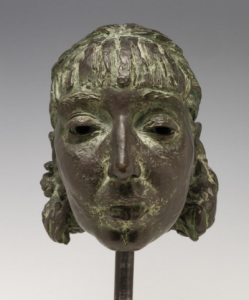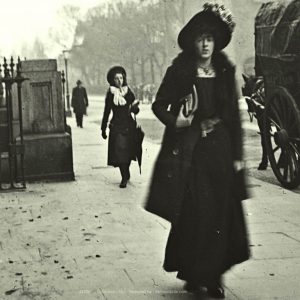Jacob Epstein (1880-1959), Fourth Portrait of Dolores (Head) (1923)
Epstein, wishing to break free from pretty, ornate art, used bronze and stone as his materials to create controversial sculptures that often challenged the taboos placed on the depiction of sexuality. Similarly, James Joyce, in the final lines of his revolutionary 1922 novel, Ulysses, wrote out what many believe to be Molly Bloom, the character speaking, having an orgasm as she lies down beside her husband, Leopold. Ulysses was banned essentially everywhere when it first came out. Epstein often experienced similar shock to his large nude pieces. Dolores, 1923, depicts a young woman with no particular great beauty or defining features, but that evidently has a strong willed mind. Around this time in the 1920s, women were gaining a sense of self and independence, including fighting for the right to vote. Both Epstein and Joyce in their own ways often portrayed these new women.
“And I was a Flower of the mountain yes when I put the rose in my hair like the Andalusian girls used or shall I wear a red yes and how he kissed me under the Moorish wall and I thought well as well him as another and then I asked him with my eyes to ask again yes and then he asked me would I yes to say yes my mountain flower and first I put my arms around him yes and drew him down to me so he could feel my breasts all perfume yes and his heart was going like mad and yes I said yes I will Yes.”
James Joyce, Ulysses
Youth Perspective Case Study
Name: Dorothy Jones
Age: 15
Year: 1917 London
Dorothy Jones is a 15 year old girl who lives with her mother, father, older brother and two older sisters in London, England, in the year 1917. The First World War has been raging on, but Dorothy hopes it will end soon; she wants her older brother, Matthew, to come back home from France. He sends her postcards whenever he can. She thinks France looks beautiful, but her older sister, Rose, tells her that France doesn’t look like that anymore because of the bombs. Dorothy would still like to visit one day anyway.
Her father is a banker at the Bank of England, but he’s been so busy that he hasn’t had time to keep an eye on his daughters. To Dorothy’s mother’s dismay, her oldest sister, Edith, is a suffragette, fighting for women’s right to vote. Dorothy knows her mother wants women to have the right to vote, but that she is worried about Edith getting arrested. Edith tells Dorothy often that women should have all the same rights as men do, including voting.
Her sister Rose agrees. Rose makes their father very angry because she’s always out drinking and smoking at jazz clubs with her friends. Their father calls Rose a flapper. Dorothy hears Rose laugh at her angry father and says she’s helping the women’s cause just as much as Edith is. Dorothy wants to help women too and asks Rose if she can go with her, but Rose says she’s too young.
Mainly, Dorothy tries to help her mother at home when she isn’t in school, as the war rations have made living uncomfortable. She knows that other girls at her school are having a harder time than their family is though, so Dorothy tries to not complain. In the evenings, when her older sisters are gone, her father lets her help with his banking numbers, as Dorothy is very good at math and she wants to help somehow too.
Categories: The New Woman, Urbanization and Industrialization, Youth, Female Perspective




